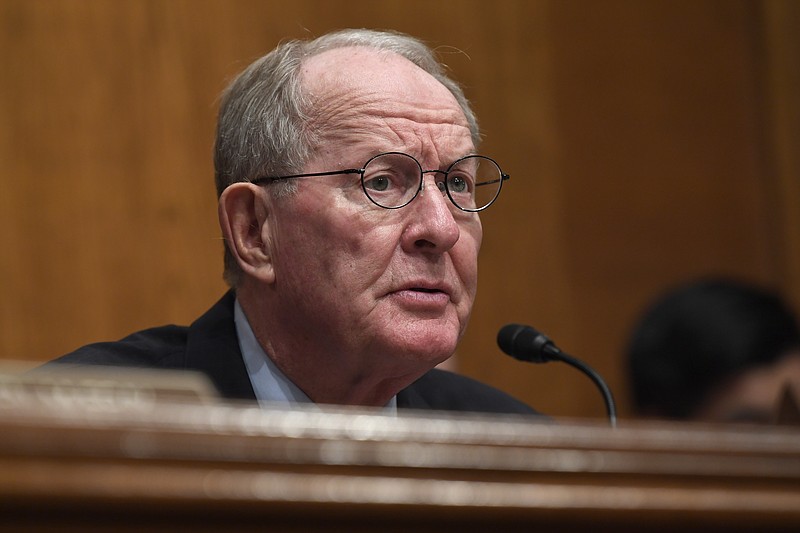NASHVILLE - A yearslong effort by U.S. Senate Education Committee Chairman Lamar Alexander to simplify an application form for current and prospective college students seeking federal aid cleared Congress last week.
The bill, called the FUTURE Act, also permanently reauthorizes and provides $255 million in annual mandatory funding for historically black colleges and universities and other minority serving institutions. Tennessee is home to seven HBCU institutions, including Fisk University, Meharry Medical College and Lane College.
Alexander, a Tennessee Republican and former U.S. education secretary, called the deletion of up to 22 questions on the Free Application for Federal Student Aid form a "big first step in simplifying the FAFSA," a move that should help end what he said is a "bureaucratic nightmare" for millions of students.
His provision was approved as an amendment.
"It's hard to think of a piece of legislation that would have more of a lasting impact on minority students and their families than this bill," Alexander said in a news release.
For starters, the overall legislation "provides permanent funding - that is fully paid for - for HBCUs and other Minority Serving Institutions attended by over 2 million minority students," Alexander noted.
"Second, after five years of bipartisan effort, it greatly simplifies the Free Application for Federal Student Aid - the FAFSA - that 20 million families, including 8 million minority students, fill out every year to qualify for federal student aid," Alexander added.
The bill ends requirements that families provide the same tax information, first to the IRS, then again to the U.S. Department of Education. Students will now be able to give permission to the IRS and the Department of Education to share tax return data.
That eliminates up to 22 questions on the FAFSA with one click, according to Alexander. And, he added, it should eliminate most of what he called "the so-called 'verification' process, which is a bureaucratic nightmare that 5.5 million students go through annually to make sure the information they gave to the Department of Education is exactly the same as they gave to the IRS."
It also benefits taxpayers by eliminating up to $6 billion each year "in mistakes - both in overpayments and underpayments - in Pell grants and student loans," Alexander said.
$738 billion NDAA bill: Funding for military leave, Space Force
The Democratic-controlled U.S. House last week approved a $738 billion defense policy bill compromise worked out with the Senate. It provides the first paid family leave for more than 2 million federal workers for the first time as well as for the creation of a Space Force, a priority championed by President Donald Trump.
It's expected to be acted on this week by the Republican-led Senate.
The National Defense Authorization Act "provides our men and women in uniform with a 3.1% pay increase - the first since 2010," said U.S. Senate Marsha Blackburn, R-Tenn., a Senate Armed Services Committee member.
"It eliminates the 'Widow's Tax' over three years, resulting in full annuity to be paid out on and after January 1, 2023," Blackburn said. "The legislation also provides much-needed oversight of the Privatized Military Housing Program, including creation of a Resident Bill of Rights."
The bill was caught up for months in wrangling over provisions related to Trump's border wall funding. In the end, it does not bar the president from using military funds for it. But Democrats did successfully insert a policy granting all federal workers 12 weeks of paid parental leave.
The Space Force, meanwhile, will be a new branch of the military housed in the Department of the Air Force in a setup similar to the Marine Corps' relationship to the Department of Navy. Its purpose is to shield U.S. space assets from Russian and Chinese threat.
"We need to establish a Space Force because we need to keep world-wide GPS safe, world-wide ATMs safe, and, most importantly, to keep you safe," U.S. Rep. Jim Cooper, a Nashville Democrat who serves as chairman of the House Armed Services' Subcommittee on Strategic Defense, which includes missiles and space operations.
"This is not a Trump idea," Cooper said at a press roundtable last week. "He tried to hijack it long after the House Armed Services Committee voted 60-1, on a totally bipartisan and nearly unanimous basis, to establish a Space Corps. Trump's belated support for a Space Force does not make this a Republican idea."
Cooper said it's been a yearslong, bipartisan focus "since the first Pentagon space command in 1985, an initiative that was sadly terminated in 2002 when America got distracted by the War on Terror.
The service was first proposed by the House in 2017 as Space Corps.
Another Tennessee representative on the Armed Services Committee, Republican Mark Green, of Clarksville, is touting, among the defense bill's other provisions, the inclusion of his "Spiritual Defense Readiness" provision.
He said the provision directs the Department of Defense to assess the availability of chaplains, houses of worship, and spiritual resources for military service members who identify as religiously affiliated.
"Those who profess a faith but are not able to practice it while serving are five times more likely to commit suicide," said Green, a physician and combat veteran who served in Iraq and Afghanistan.
Contact Andy Sher at asher@timesfreepress.com or 615-255-0550. Follow him on Twitter @AndySher1.
